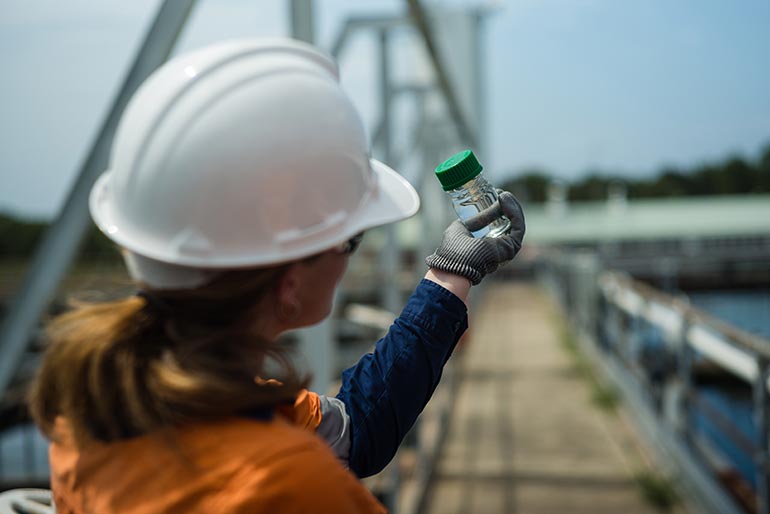Every time you turn on your tap, flush your toilet or water your garden, a team of skilled professionals in Canada’s water sector are working behind the scenes to ensure these systems function seamlessly. From delivering high quality drinking water to homes and businesses, to supporting industrial operations and irrigation systems, to maintaining the pressure needed for firefighting through hydrants, these workers are the backbone of our water infrastructure. They also ensure wastewater is treated safely before being returned to the environment, protecting public health and ecosystems. Without their expertise, these essential services would be at risk.
That’s why Canada’s water industry is facing a critical challenge. There’s a growing shortage of trained water management workers. This issue isn’t just about failing infrastructure—it’s about the lack of people equipped to manage and operate modern water and wastewater systems.
Today’s water treatment plants are no longer simple facilities focused on pipes and pumps. They are high-tech operations requiring expertise in chemistry, data analysis, cybersecurity and artificial intelligence. Workers must navigate complex digital systems while ensuring public health and environmental safety. Yet, the industry is struggling to attract the talent needed to meet these demands.

The Retirement Wave and the Skills Gap
Experts predict that nearly half of Canada’s water management workforce could retire within the next decade— they call this the “silver tsunami.” This looming retirement wave coincides with the increasing technological sophistication of water systems, creating a significant skills gap. While older workers often find it challenging to adapt to digital systems, younger, tech-savvy professionals rarely consider careers in water management. Many still perceive these roles as outdated, blue-collar jobs, unaware of the advanced technology now integral to the field and the potential for a thriving career.
This disconnect has serious implications. Without enough skilled workers, municipal water departments risk service interruptions, delayed maintenance and higher operational costs. Municipalities and utilities are already competing for the limited pool of qualified candidates, driving up wages and forcing difficult choices between training new staff and maintaining aging infrastructure.
A New Look at Water Industry Careers
To address this crisis, the water industry must change public perceptions of its careers. These roles are not just essential but also cutting-edge, offering opportunities to work with advanced technology while contributing to public health and environmental sustainability. Many people still view water industry jobs as outdated or purely manual labour, unaware of the sophisticated tools and systems now part of the industry. This outdated perception has made it difficult to attract the next generation of skilled workers.
Outreach efforts should focus on educating students, career counselors and young professionals about the array of opportunities available in the water sector. Highlighting the industry’s stability, competitive pay and potential for career growth is key to drawing interest. By showcasing the advanced technology used in water management—such as artificial intelligence, data analytics and cybersecurity—the industry can appeal to tech-savvy individuals who might otherwise overlook these roles. Additionally, emphasizing the societal impact of these careers, such as protecting public health and the environment, can inspire a sense of purpose among potential candidates.
Yet it's not just about attracting young workers. It's also about attracting workers in transition such as veterans and those seeking new career paths.

Solving the Skills Gap with Training and Partnerships
Our municipalities and provinces need to prioritize comprehensive training programs that blend traditional skills with modern technological expertise. Collaborations with educational institutions can create specialized curricula to prepare the next generation of water professionals. Internships, apprenticeships and scholarships can also attract diverse talent, including career changers, veterans and women, to the field.
Clear career pathways are equally important. New workers want to see opportunities for advancement, and the water industry must show clearly that it can offer long-term, rewarding careers comparable to those in other high-tech sectors.
Some organizations are already leading the way by partnering with schools, offering hands-on training, and integrating digital skills into their programs. These initiatives are proving effective, but isolated efforts are not enough. The entire industry must collaborate to build a robust pipeline of skilled workers.
The stakes are high. Without immediate action, Canada risks compromising its ability to provide safe, reliable water services—a fundamental public health necessity. This is not just an industry challenge; it’s a societal issue that demands urgent attention.
Securing the Future of Canada’s Water
The solution is clear: prioritize workforce development as much as infrastructure maintenance. By investing in training, outreach and partnerships, Canada’s water industry can overcome its skilled worker shortage and ensure the sustainability of its water systems. The future of water depends on it.



